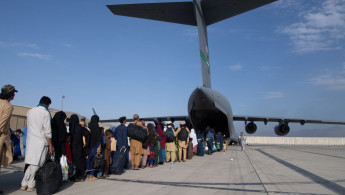Afghan pilot avoids deportation to Rwanda after UK PM Rishi Sunak intervention
An Afghan pilot in the UK who was threatened with deportation to Rwanda has been given permanent residency after Prime Minister Rishi Sunak was forced to intervene in the controversial case.
The air force lieutenant, involved in 30 combat missions against the Taliban, arrive in the UK via a small boat after he said it was "impossible" to reach the country via another legal route.
The Home Office warned he faced removal to Rwanda because of evidence he travelled through safe countries including Italy, Switzerland, and France, which meant his claim was inadmissible.
However, the Afghan - who remains unnamed to protect his identity - was ultimately granted indefinite permission to stay through the Afghan Relocations and Assistance Policy (ARAP) after Sunak personally looked at the case.
"These are exactly the sort of people we want to help," Sunak said earlier this week when speaking to a liaison committee.
The Afghan has accused American and British forces of "forgetting" the military personnel who fought alongside them during their 20-year missions in Afghanistan, according to The Independent.
"What safe and legal way was there after the fall of Afghanistan? You entered Afghanistan on the first day as a friendly and brotherly country, and now this bad day has come upon us," the asylum seeker said.
US and UK forces withdrew from Afghanistan in 2021, creating a security and political vacuum in which the Taliban were able to swiftly seized power once again.
The hardline rulers have launched a crackdown on freedom of speech, minority groups, and women’s rights, while the Afghan economy has collapsed due to insecurity, mismanagement, and the freezing of foreign reverses.
Around 24,000 Afghans have arrived in the UK, and 21,000 have been resettled under various schemes including ARAP and the Afghan Citizens Resettlement Scheme.
It is estimated that somewhere between 75,000 and 150,000 Afghans applied for assistance from the UK government, meaning just 5 percent of people have been offered the chance of refuge.





 Follow the Middle East's top stories in English at The New Arab on Google News
Follow the Middle East's top stories in English at The New Arab on Google News
![Netanyahu furiously denounced the ICC [Getty]](/sites/default/files/styles/image_330x185/public/2024-11/GettyImages-2169352575.jpg?h=199d8c1f&itok=-vRiruf5)
![Both Hamas and the Palestinian Authority welcomed the ICC arrest warrants [Getty]](/sites/default/files/styles/image_330x185/public/2024-11/GettyImages-2178351173.jpg?h=199d8c1f&itok=TV858iVg)
